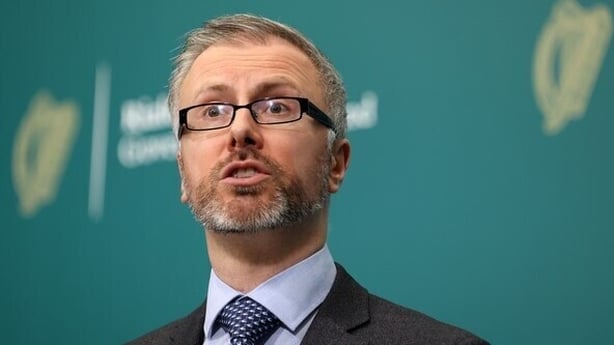The Government will not introduce congestion charges, the Taoiseach has told the Dáil.
It comes after Minister for Transport Eamon Ryan was set to seek Cabinet approval this morning to develop a plan to reduce traffic congestion in towns and cities.
The National Demand Management Strategy is likely to examine ways to reallocate more road space for walking and cycling as part of efforts to improve air quality.
This strategy is a key part of the Government's climate action plan and it will involve widespread public consultation.
It is expected to look at the possibility of having more car-free zones and introducing charges for driving in certain areas.
The strategy is likely to focus on what Mr Ryan describes as the benefits of freeing up roads and public spaces for people.
However, Mr Ryan was set to emphasise to colleagues that any changes would work best if there are public transport and active travel options nearby.
Leo Varadkar told the chamber this afternoon that "perhaps at some point down the line, when the metro is picking up people in Dublin Airport," when other infrastructure projects are in place and when "all vehicles are electric", it will perhaps be considered.
"There is no proposal from this Government to introduce congestion charges", he said.
"Certainly not under this Government and not in the foreseeable future", he added.
He was responding to Mick Barry, Solidarity-PBP TD.
We need your consent to load this rte-player contentWe use rte-player to manage extra content that can set cookies on your device and collect data about your activity. Please review their details and accept them to load the content.Manage Preferences
Minister for Finance Michael McGrath was also expected to tell Government colleagues that inflation this year will average between 4% and 5%, down from the current rate of 7%.
Child care bill to be discussed

Separately, Minister for Children Roderic O'Gorman was set to bring the General Scheme of the Child Care Amendment Bill to Cabinet.
The legislation seeks to strengthen the Child Care Act 1991, which governs child protection and children taken into care.
The proposed changes include a new guiding principles section to the act, with the best interests of the child to be the paramount principle.
It will place a duty on Government agencies and bodies to cooperate with Tusla in relation to child welfare and protection.
The legislation also proposes enhanced enforced powers for the Tusla Early Years Inspectorate in relation to childcare services.
This will allow for improved information sharing with parents, and the introduction of a "fit person" regulation to empower Tusla to assess the suitability of a person applying to be a registered provider.







